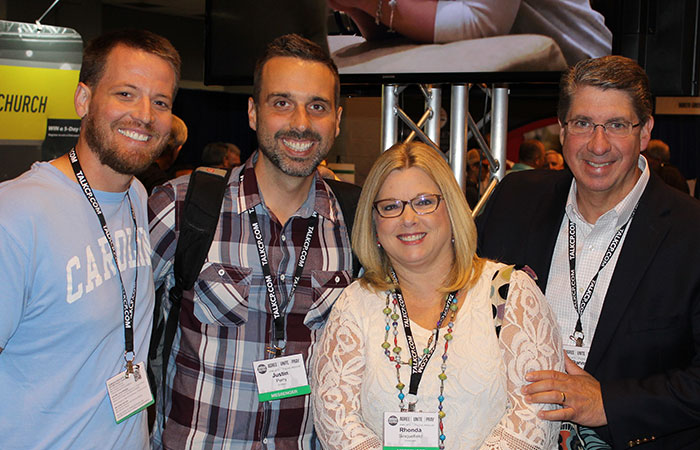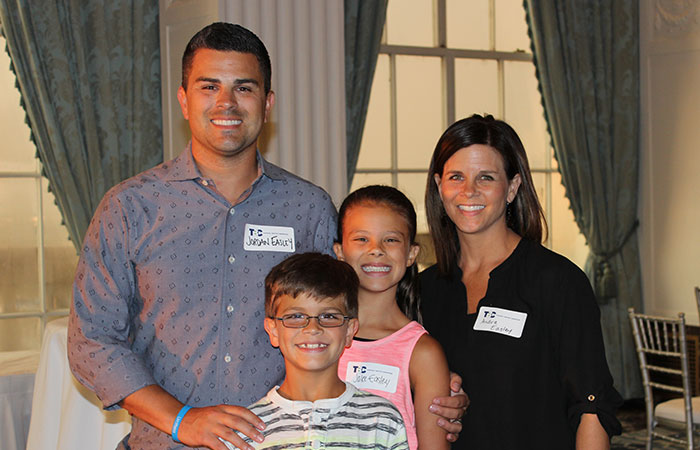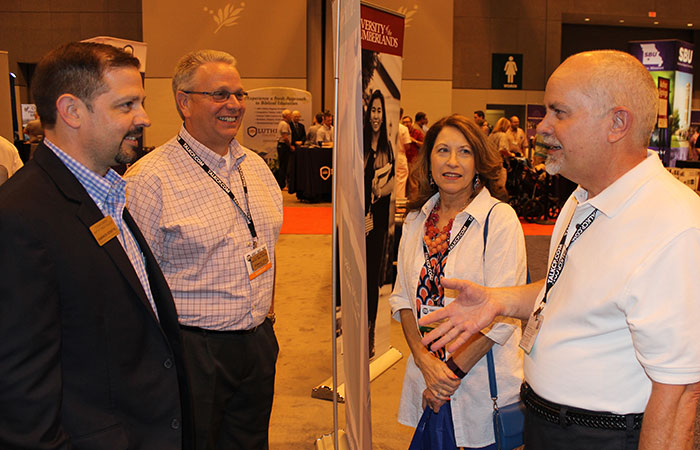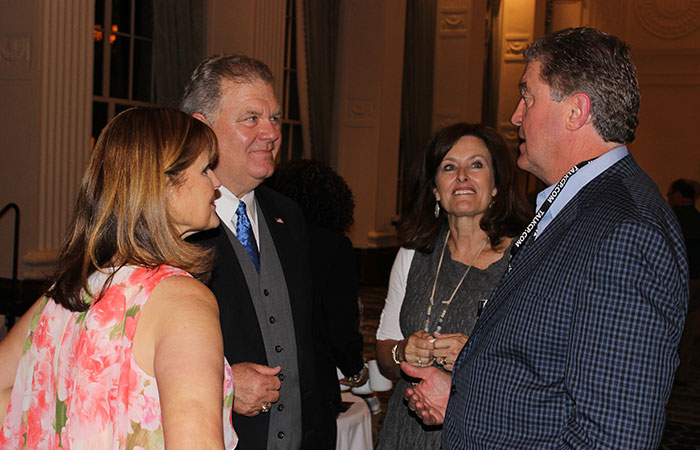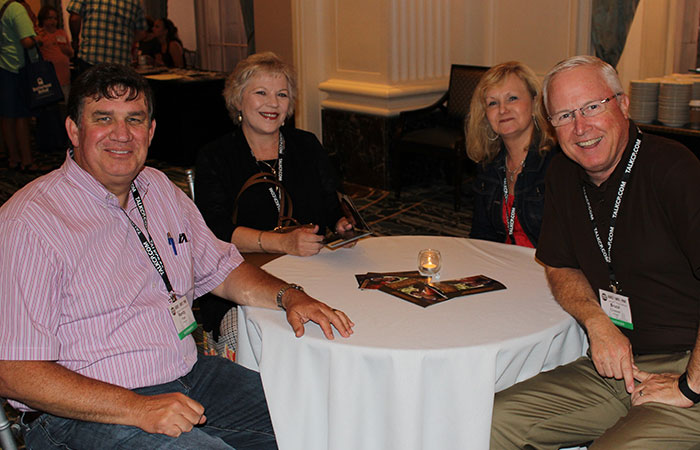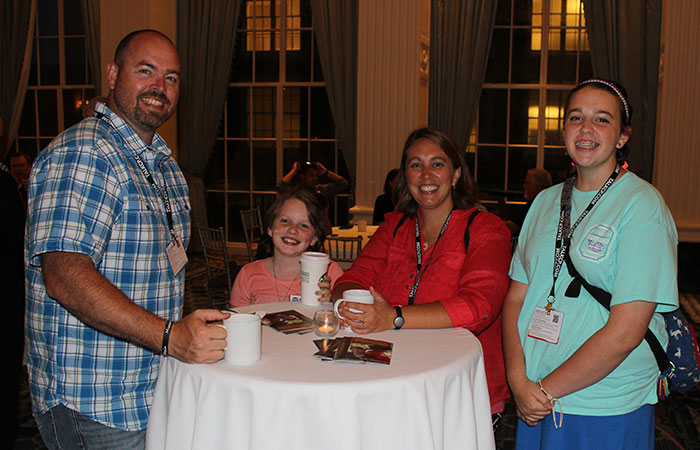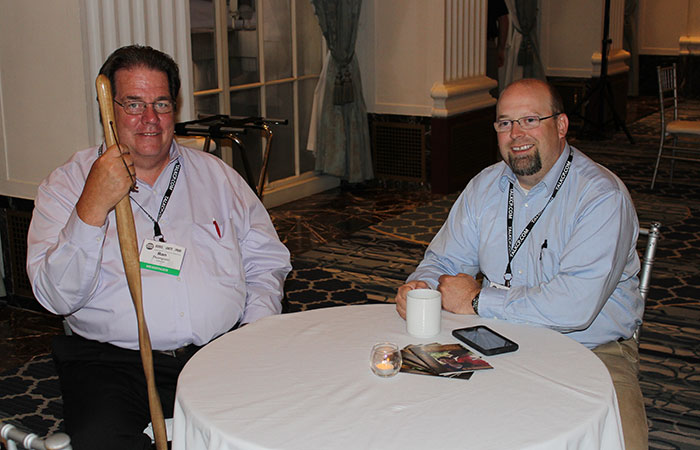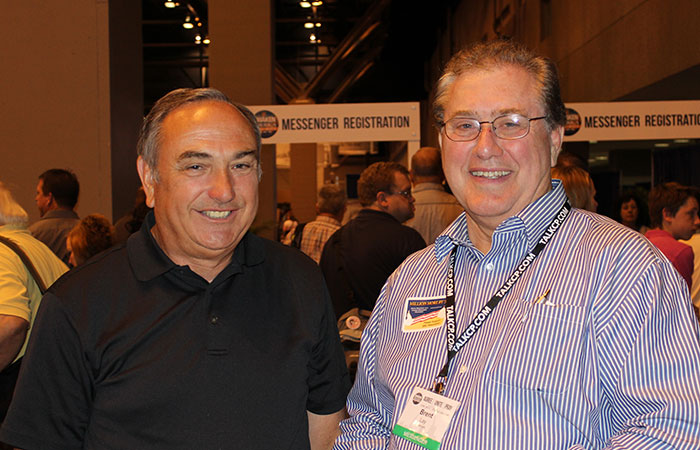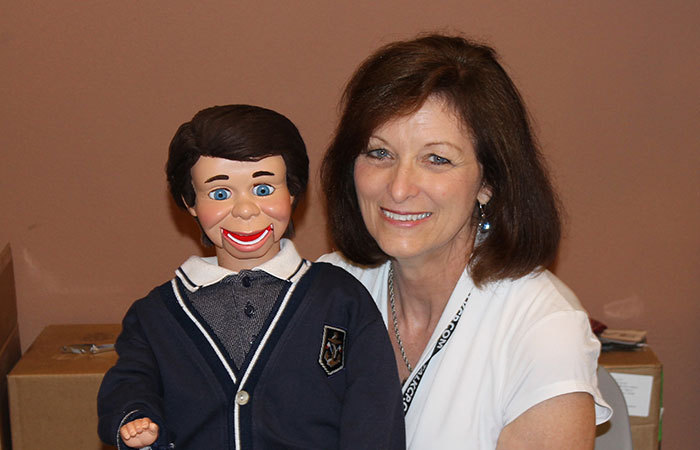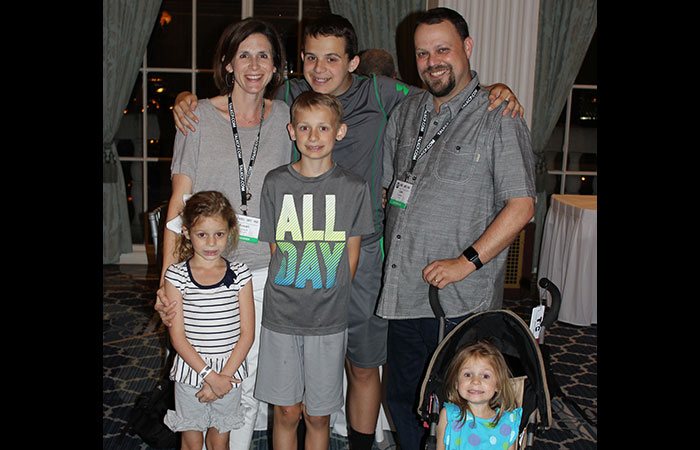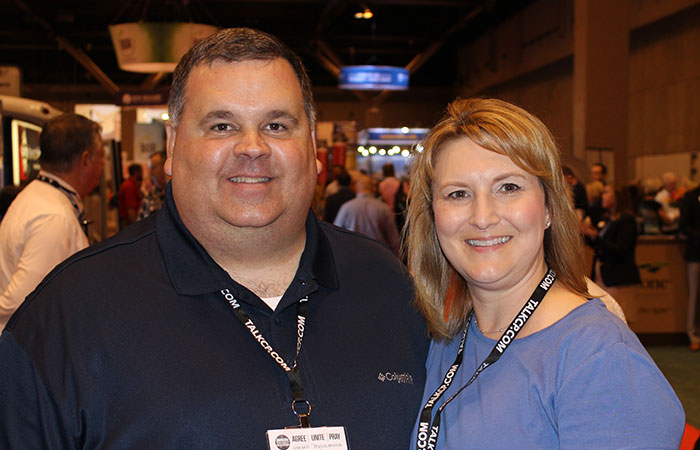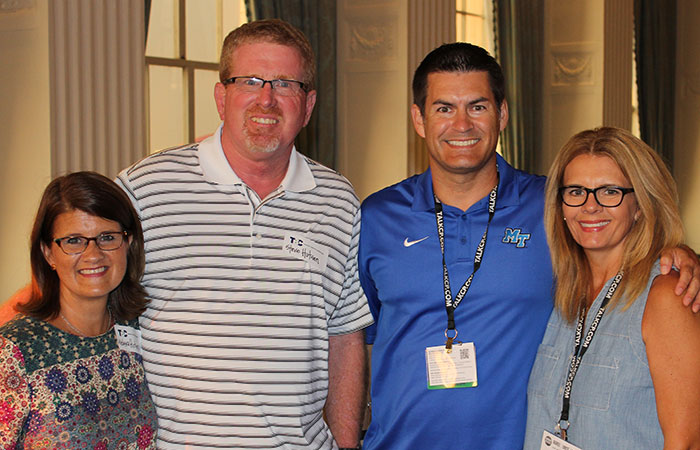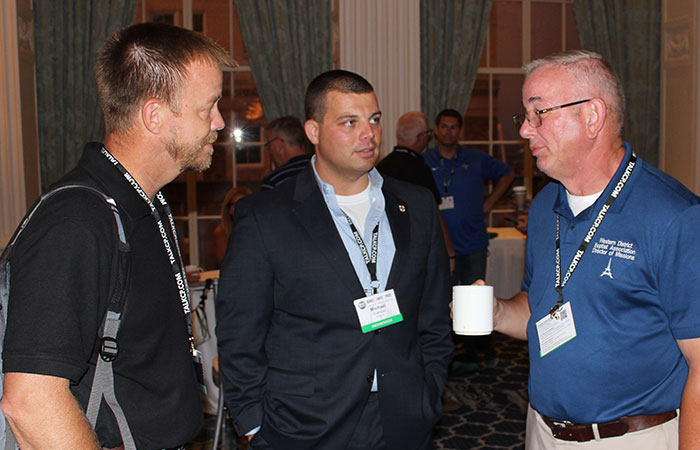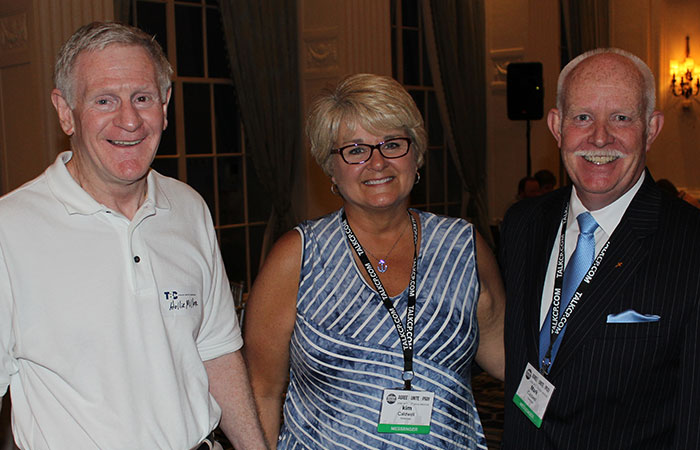Tennessee Baptists second in number of Southern Baptist Convention messengers with 824
By David Roach
Baptist Press
Editor’s Note: Due to the publication schedule of the Baptist and Reflector, this issue contains a condensed wrap-up of the SBC annual meeting held June 14-15 in St. Louis. Extensive stories were posted on the B&R web site last week.

Outgoing Southern Baptist Convention President Ronnie Floyd, left, together with presidential nominee J.D. Greear, center, congratulate Steve Gaines, pastor of Bellevue Baptist Church in Cordova after he is elected president of the SBC. Greear withdrew from the race and moved that the convention elect Gaines by acclamation during the SBC’s annual meeting at America’s Center in St. Louis on June 15. — Photo by Bill Bangham
ST. LOUIS — The election of Tennessee pastor Steve Gaines as president on the third ballot and a historic repudiation of the Confederate battle flag were among the highlights of the Southern Baptist Convention annual meeting June 14-15 in St. Louis.
The convention’s resolution on the Confederate battle flag capped an emphasis on racial reconciliation throughout the meeting that included the election of a 2017 Committee on Nominations with 25 percent of its members drawn from ethnic minority groups and a panel discussion on “racial unity in America” featuring Jerry Young, president of the historically African American National Baptist Convention, USA, Inc.
The unofficial total of 7,321 registered messengers — up from 5,407 last year — also devoted an entire session to praying for awakening in America, listened to a panel discussion on “pastors and the church in American politics today,” and addressed on multiple occasions whether Baptists should support Muslims’ right to build mosques in the United States.
When registered guests, exhibitors, and others are included, the count of those at the annual meeting was tallied, as of June 15, at 11,581. Tennessee ranked second in number of messengers to the annual meeting with 824, trailing only host state Missouri’s 877 messengers.
Presidential election
On the second ballot, neither Gaines, pastor of Bellevue Baptist Church in Cordova, Tenn., nor North Carolina pastor J.D. Greear obtained a majority, with Gaines receiving 49.96 percent, Greear 47.80 percent and 108 ballots ruled illegal.
Messengers would have had to choose for the second time among the same two presidential candidates — what chief parliamentarian Barry McCarty called the first time in SBC history — but Greear withdrew his candidacy and moved that the convention elect Gaines by acclamation. Recording secretary John Yeats said the presidential election has not gone to a third ballot in at least 20 years, the time that Yeats has served as recording secretary.

Steve Gaines, pastor of Bellevue Baptist Church in Cordova, agrees to be president of the Southern Baptist Convention after J.D. Greear withdrew from the race and moved that the convention elect Gaines by acclamation during the annual meeting of the SBC at America’s Center in St. Louis on Wednesday, June 15. “I just wanted Jesus to be lifted high” and the convention to be united, Gaines said. — Photo by Bill Bangham
On the first ballot, Greear led with 44.97 percent of the vote while Gaines had 44.1 percent. Louisiana pastor David Crosby, who was also nominated for president, had 10.08 percent.
Greear, pastor of The Summit Church in Raleigh-Durham, N.C., said he decided to withdraw after praying Tuesday night because Southern Baptists “need to leave St. Louis united.” Gaines told the convention “there’s no way God’s not doing something in all of this.”
In a press conference following his election, Gaines said both he and Greear were “sensing the Holy Spirit moving in the same direction. We had a great time talking last night and we talked to the Lord and we talked about the situation.”
In response to a question Gaines noted that while God was prompting both men to pull out, Floyd also was praying. “That’s not coincidental,” Gaines said. “That is the sovereign God ordaining something and so I believe with all my heart that it was a special moment when both J.D. and I realized that God had said the same thing to both of us.”
Recounting the conversation, Gaines said, “I looked at him and said, ‘You can have it.’ He said, ‘No, I want you to have it.’ It was more like that. I said, ‘Let’s just don’t vote on it because if we have another vote it’s going to be another tie.’ It couldn’t have gone better. He was just very gracious. He’s the J.D. I know him to be.”
What happened was really a blessing from God, Gaines observed. “I pray God will use it to help us go forward and tell people about Jesus Christ.”
In response to a question Gaines stressed unity. “What you just saw is that when the leaders are unified in the Lord Jesus Christ, it brings unity to the body.”
Racial reconciliation
The Resolutions Committee originally proposed a resolution on the Confederate battle flag calling believers “to consider prayerfully whether to limit, or even more so, discontinue its display,” but also stating that for some the flag is not “a symbol of hatred, bigotry, and racism.”
But former SBC President James Merritt moved that the reference to the flag’s not being a racist symbol for some be removed and that the convention call believers to “discontinue the display of the Confederate battle flag as a sign of solidarity with the whole Body of Christ, including our African American brothers and sisters.”
Messengers adopted Merritt’s amendment and the resolution by wide margins after he told the convention support of the flag hinders evangelism among African Americans and said, “Southern Baptists are not a people of any flag. We march under the banner of the cross of Jesus and the grace of God.”
During a nationally televised prayer service that night, Young, of the NBC USA, said the wall of racism “is already down.” Hours before the resolution’s adoption, Young told Southern Baptists racism in America stems in part from the church’s failure to be salt and light. “Somebody needs to pass the salt and turn on the lights,” he said.

Randy C. Davis, executive director of the Tennessee Baptist Convention, leads a prayer for Steve and Donna Gaines (surrounded by fellow Tennessee Baptists) during a fellowship for Tennessee Baptist messengers hosted by the TBC in St. Louis. — Photo by Lonnie Wilkey
Young’s comments came during the racial unity panel discussion, which also included a multi-ethnic array of Southern Baptist leaders.
Outgoing SBC President Ronnie Floyd called racism “an assault on the gospel of Jesus Christ” during his presidential address. He recognized the great great granddaughter of Dred Scott, the slave who was a party to the infamous Supreme Court decision bearing his name. “Any form of racism,” Floyd said, “defies the dignity of human life.”
Prayer for awakening
The Tuesday night “national call to prayer” featured two hours of prayer for awakening in America and around the world. Brief addresses were delivered by a multi-denominational team of leaders, including former SBC President Johnny Hunt, Sen. James Lankford of Oklahoma, California pastor and evangelist Greg Laurie, Tennessee pastor John Avant of First Baptist Church, Concord, Knoxville; and Young.
Pastors, politics, and liberty
A Wednesday afternoon panel discussion considered the role of pastors and churches in American politics. The panel featured five pastors and written comments submitted by Liberty Counsel founder and chairman Mat Staver, who was unable to attend.
During the panel discussion Jack Graham, pastor of Prestonwood Baptist Church in Plano, Texas, said the three most important issues in the 2016 U.S. presidential election are the sanctity of life, religious liberty, and the appointment of Supreme Court justices. K. Marshall Williams, pastor of Nazarene Baptist Church in Philadelphia, said believers should also consider “systemic racism and injustice” as well as “the pipeline from school to prison” among African American males.
Messengers also adopted a resolution calling on “Southern Baptists and all followers of Jesus Christ in the United States to participate in the democratic process by voting.”
On at least three occasions, messengers addressed Muslims’ right to build mosques in America.
A motion from the floor asked the convention to remove from their positions Southern Baptist “officers” and “officials” who support Muslims’ right to build mosques in America. A separate motion asked the SBC to withdraw its amicus brief in a federal lawsuit involving the Islamic Society of Basking Ridge (N.J.). Both motions were ruled out of order, with the Committee on Order of Business noting the Ethics & Religious Liberty Commission signed onto an amicus brief, not the SBC. The International Mission Board also signed the brief.

Frank S. Page, president of the Southern Baptist Convention Executive Committee, presents retiring Woman’s Missionary Union Executive Director Wanda Lee with a resolution of appreciation during the annual meeting of the SBC in St. Louis Tuesday, June 14. — Photo by Matt Miller
During the ERLC report, a messenger asked ERLC President Russell Moore how any Southern Baptist can defend the right to build mosques in light of the fact some Muslims are terrorists. Moore responded that part of “what it means to be a Baptist is to support soul freedom for everyone.” The gospel, not government coercion, is the answer to Islam, he said.
Missions and evangelism
Messengers adopted an Executive Committee resolution of appreciation for Wanda Lee, retiring executive director/treasurer of the Woman’s Missionary Union. The resolution noted that during Lee’s 16-plus years of service, WMU has helped raise nearly a combined $3 billion for the Lottie Moon Christmas Offering for International Missions and the Annie Armstrong Easter Offering for North American Missions — “which constitutes more than one-half of the total amount raised through these two offerings since they began being reported.”
IMB President David Platt reported that following a “difficult” reduction this year of more than 1,000 missionaries, “for 2017, we will be operating with a balanced budget with the stage set for a healthy financial future.” He thanked Southern Baptists for a record Lottie Moon Offering for 2015-16, which exceeded the previous high mark by more than $11 million.
North American Mission Board President Kevin Ezell said NAMB planted 926 churches last year. Among all NAMB church plants, one person is baptized annually for every 14 church members. In established churches, the ratio is one baptism per 52 members, Ezell said.
Crossover St. Louis, the convention’s evangelistic blitz preceding the annual meeting, yielded 556 professions of faith in Christ as Lord and Savior, the first increase in three years.
- Messengers granted final approval for Golden Gate Baptist Theological Seminary to change its name to Gateway Seminary of the Southern Baptist Convention.
- A scheduled panel discussion in which all entity heads would have fielded messenger questions together was canceled because the Executive Committee did not approve an SBC bylaw change to allow the panel format for entity questions. Instead, each entity president fielded questions following his report.
- Messengers made 22 motions, with 12 ruled out of order and 10 referred to entities or committees.
Among the motions was one presented by Baptist and Reflector Editor Lonnie Wilkey to ask trustees of all SBC entities to consider examining their media policies, and if they do not have clearly defined guidelines, to consider establishing a policy that trustee and committee meetings be open to the public. The motion was referred to the Executive Committee and all SBC entities.
- In addition to the resolution on the Confederate flag, 11 other resolutions addressed topics including the June 12 terrorist attack in Orlando, Fla.; “biblical sexuality and the freedom of conscience;” requiring women to register for the military draft; freedom of the press; and ministry to refugees.
- Illinois pastor Doug Munton was elected first vice president without opposition. Missouri pastor Malachi O’Brien was elected second vice president from among two other nominees. Yeats was re-elected to a 20th term as recording secretary, and Jim Wells was re-elected registration secretary for a 15th term.
- A Tuesday morning ceremony honored America and its veterans, with an appearance by one of the 2,000 remaining survivors of the Japanese attack on Pearl Harbor in 1941. A messenger’s motion requested that future SBC online registration forms ask messengers whether they have served in the military and that such service be indicated on messenger badges.
- Two Tennessee Baptists were named to the 2016-17 Committee on Nominations — Jeff Lovingood of First Baptist Church, Cleveland, and David Perdue of Bellevue Baptist Church, Cordova.
- Messengers approved future SBC meeting sites: Nashville, 2021; Anaheim, Calif., 2022; Charlotte, N.C., 2023; and Indianapolis, Ind., 2024.
- Messengers approved a 2016-17 Cooperative Program Allocation Budget of $189 million, up from $186.5 million in the current Oct. 1 – Sept. 30 fiscal year. The CP budget maintains current allocations of 50.41 percent of receipts to the International Mission Board and 22.79 percent to the North American Mission Board, for a total of 73.20 percent for missions ministries nationally and internationally.
— Article includes reporting by B&R Editor Lonnie Wilkey.


